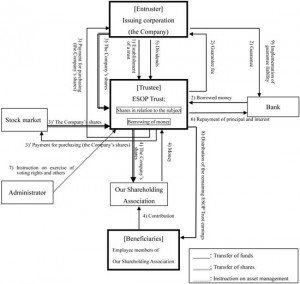Employee Stock Option Plans ESOPs and its Pricing
Esops, which give employees a stake in the ownership of the company, are provided by the company to employees to boost their motivation and loyalty. Esops gives an employee the right to buy the company’s shares during a predetermined time period and at a predetermined price (strike price). Generally, the strike price of the shares is offered to the employees at par or at a discount to the prevailing market prices.ESOPs are structured in such a way that the option to buy the shares at a discount can be exercised only after a certain period of time, which is known as the vesting period. So for example, an employee may be able to exercise his right over his shares after a vesting period of one year. In some instances, he may be allowed to claim to a certain percentage of shares, known as the vesting percentage after one year and the rest over the next few years.
ESOPs or Employee Stock Option Plans are planned within which employees are awarded Stock Options based on performance. Employees have the right to buy shares in the company on a fixed date at a fixed price. Stock options may be priced at market rate (i.e. current list price of the share on the stock exchange) or at a lower price (i.e. a preferential price lower than the current list price on the stock exchange). For private firms, not yet listed on the stock exchange, stock options may be priced at a level that management considers fair. Quite often ESOPs are offered to only certain tiers of employees, typically management and executives. However, some organizations offer stock options to all employees. In many start-ups the practice of offering stock options to all employees is common.
Organizations offer ESOPs in order to motivate employees towards better long-term performance by offering them a share in the ownership of the company. The reasoning is that employees who feel as though they are owners will be more invested in steady, long-term success and will work in a way that is aligned with business goals.
How ESOPs work
An employee who has been granted stock options must generally wait through a vesting period before (s) he can exercise (i.e. sell) the options. The exercise price of a stock option is usually the current price of the stock at the time of issue. An employee stands to gain a tremendous amount of profit by working to increase the worth of the organization and in turn, its stock valuation at the time the options vest. The higher the stock price rises, the more difference there is between the exercise price and the selling price. Organizations rely on this as a motivator for employee performance.
Vesting periods can be of two types:
- Cliff Vesting: The employee gets all of the granted stock options at the same time after a specific time period has passed. For example, an employee, who has been granted 100 units of stock at a preferential price with a cliff vesting period of three years, will receive all 100 units on the date that coincides with the three-year period.
- Graded Vesting: The employee receives the stock options in increments that are tied to the completion of specific time periods. Additionally, graded vesting may be uniform or non-uniform. For example, an employee who has been granted 100 units of stock at current market price with a uniform graded vesting period of 20% for each year of 5 years would receive 20 units of stock for each year of employment until 5 years and 100 units have been reached. An example of a non-uniform vesting period would be a three-year period with 20%, 20% and 50% vesting in each successive year.
Vesting periods serve two purposes – one, they act as retention tools by ensuring that employees complete a certain period of service with the organization before they can take advantage of options, and two, because of this long service requirement employees may more motivated to act in the best long-term interests of the organization.
Employee Stock Options are generally non-transferable. This means that they must be exercised or are allowed to expire with no value attached to them on the date they must be exercised.
Apply for Compensation and Benefits Certification Now!!
http://www.vskills.in/certification/Certified-Compensation-and-Benefits-Manager
 New Year, New Skills, New You! - Take Charge of Your Career Now!
New Year, New Skills, New You! - Take Charge of Your Career Now!




